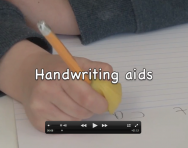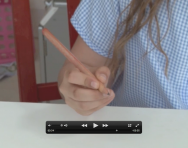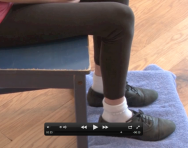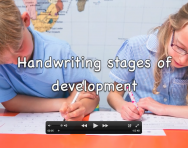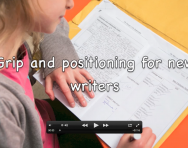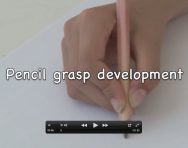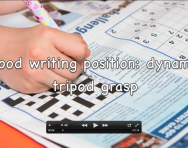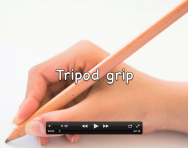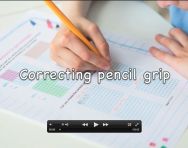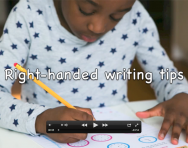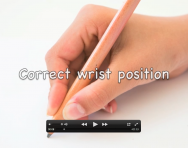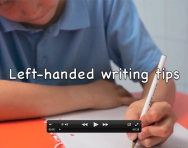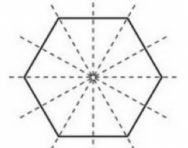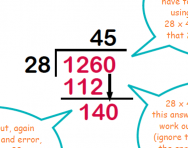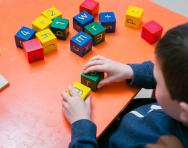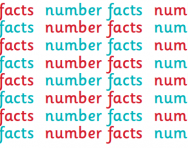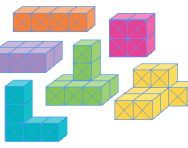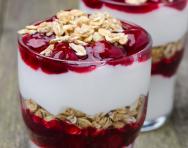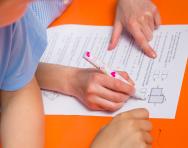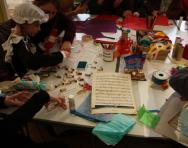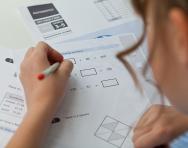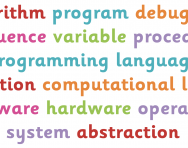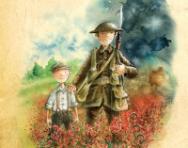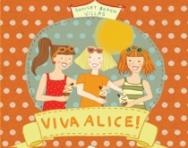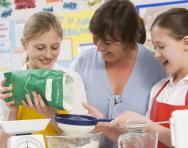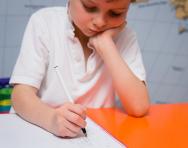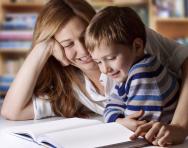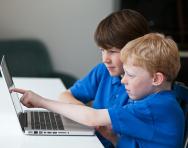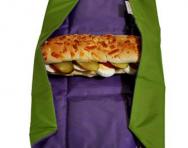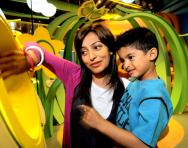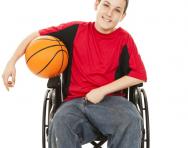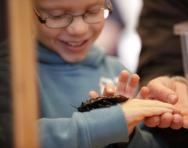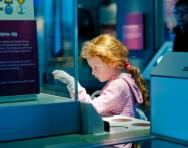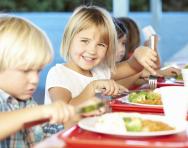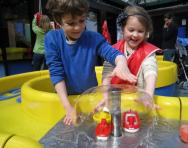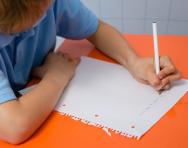Year 4 articles
Video: Handwriting aids for children
Could a writing slope or an adaptive grip help improve your child's handwriting? Occupational Paediatric Therapist Catherine Elsey explains how to use commercially available handwriting aids in our handwriting advice video.
Video: Tripod grasp quick trick
Make sure your child holds their pencil correctly every time they pick it up with this quick trick, as outlined in our video by National Handwriting Association Occupational Paediatric Therapist Catherine Elsey.
Video: Handwriting posture and seating advice
A step-by-step video guide to establishing a good seating position for comfortable handwriting, with expert advice from the National Handwriting Association and an explanation of why postural stability is vital for children.
Video: Handwriting development stages explained for parents
From anti-clockwise circles to letter formation, find out about your child's handwriting journey and how you can support them at home in TheSchoolRun's video, featuring experts from the National handwriting Association.
Video: correct handwriting grip and positioning for new writers
Help your child establish great handwriting habits from Reception and KS1 with our expert advice video for the parents of new writers. From the correct pencil grip to paper positioning and posture, the National Handwriting Association's Catherine Elsey explains what to look out for and how to make immediate improvements to help your child.
Video: Pencil grasp development
From eighteen months to five years, TheSchoolRun's handwriting video explains how children's pencil grasp changes over time, how to establish good handwriting habits early on and what to expect in every stage.
Video: The dynamic tripod grasp explained
Video advice and tips to help establish a good handwriting position, including details of the dynamic tripod grasp (the ideal hand position for writing) and why it's best for children to hold their pencil in this way when they're writing.
Video: The dynamic tripod grasp for better handwriting
Children who hold their pencil or pen in the ideal handwriting position, the dynamic tripod grip, can write comfortably for longer. The National Handwriting Association's Catherine Elsey explains how to help your child establish a confident tripod grip and how it helps avoid hand pain.
Video: Correcting pencil grip
Does your child struggle to hold their pencil correctly? Our handwriting tips video offers expert advice on correcting pencil grip and establishing the ideal dynamic tripod grasp, with tips from the National Handwriting Association.
Video: Right-handed handwriting tips and expert advice
Right-handed handwriting tips and advice from the experts, with practical examples of the best way to position paper correctly and hold the pencil with a tripod grasp. Experts from the National Handwriting Association feature in TheSchoolRun's new handwriting video series.
Video: Correct wrist position for handwriting
TheSchoolRun's new handwriting videos feature experts from the National Handwriting Association offering tips to help parents improve their children's handwriting. This video offers advice to help position the wrist correctly for fluid, comfortable handwriting.
Video: Left-handed handwriting tips and expert advice
Left-handed handwriting tips and advice from the experts, with practical examples of the best way to position paper correctly and how to hold your wrist in the optimal position for writing. TheSchoolRun's new handwriting videos feature experts from the National Handwriting Association.
What are line symmetry, reflective symmetry and rotational symmetry?
Understand the forms of symmetry your child will be taught as part of the primary-school curriculum (line symmetry, reflective symmetry and rotational symmetry) and see how the concepts are applied in the KS2 classroom.
What is long division?
Children in Year 5 and Year 6 are encouraged to use the long division method to divide larger numbers. We explain the technique and offer a step-by-step guide to using it, as well as an overview of division teaching and the division methods used in primary school.
The SEN code of practice 2014: what it means for your child
The special educational needs system underwent its biggest reform in 30 years from 2014. We explain the main changes and how they could affect your child.
What are number facts?
Children are expected to memorise a number of different number facts in primary school, including number bonds to 20 and the multiplication and division facts for the twelve times tables. We explain what number facts your child will be taught when and suggest easy ways to support their learning at home.
What is volume?
Volume and capacity are important concepts in primary maths, and your child will start learning about the amount of 3D space occupied by an object in Key Stage 1. Find out how you can support their learning at home, plus the relevant mathematical formulae, with our parents' guide to volume.
7 classic poems to read with primary-school children
Poems come in all shapes and sizes. Some rhyme, some don't. Some are old, some are new. Introduce your child to a world of words to whisper, savour and inspire with some classic poems, chosen for primary-school children of all ages by poet Helen Mort, editor of The Owl and the Pussycat: An anthology of poems that every child should read. Enjoy!
5 back-to-school breakfasts to boost body and brain
Finding it hard to get the brain back into gear every morning? Kate Percy, author of Go Faster Food for Kids, brings you her top three performance-boosting “back-to-school” breakfast recipes, plus expert tips to turn your kids' breakfast into a nutritional powerhouse.
What are NFER tests?
Never heard of NFER levels? You're not alone. We get the lowdown on these optional tests for Key Stage 1 and 2 children.
Museums reviewed by parents: The Foundling Museum
At the Foundling Museum the whole family can get a glimpse into a heartwarming piece of London history – the story of abandoned children taken in and given a home by an extraordinary group of philanthropists. And you can take a historical selfie, too!
Museums reviewed by parents: Mary Rose, Portsmouth Historic Dockyard
Travel back in time to Henry VIII's navy and its flagship, the Mary Rose. Recovered from the sea after nearly five hundred years, the ship is presented to visitors in a new, state-of-the-art museum that's highly recommended for families.
Changes to KS2 SATs in 2024: what parents need to know
If your child is in Y6 in 2024, read on for the most up-to-date SATs information for parents.
Primary school computing and ICT glossary for parents
Do you know what your child means when they're talking about compiling algorithms and debugging programs? Computing teacher Billy Rebecchi explains the primary school computing and ICT terms that you might hear from your KS1 or KS2 child.
Best children's books about WWI
Our pick of powerful, informative and evocative novels, anthologies and non-fiction books will help primary-school children understand the facts about the Great War, as well as the everyday lives of the people who lived through it in the trenches and on the Home Front.
14 of the best books for children for summer 2014
Make this summer a fiction-packed break with our pick of the best kids' books to read on the beach, by a lake, up a mountain, in a tent or just in your own back garden! From laugh-out-loud adventures to murder mysteries and junior chick lit, we've got great suggestions for every genre and every child.
Cooking and nutrition in primary schools
For the first time ever, practical cookery lessons are compulsory in primary schools. We explain what your budding MasterChef might learn.
The parent's guide to the pupil premium
Many children from families who receive certain benefits are entitled to a sum of money paid to their school to boost their learning. We explain the ins and outs of the pupil premium for parents.
4 ways to bring poetry to life for your child
With poetry on the new national curriculum for children as young as five, poet Adisa the Verbaliser explains how to make poetry magical for your child.
What your child learns in Key Stage 2 computing
In Years 3 to 6, computing lessons are a key part of the curriculum. Here’s what your child will learn in KS2.
11 of the best no-waste packed lunch solutions
You recycle cans, glass and scraps of paper religiously, but your child's daily lunch box packs the bin with a steady stream of plastic sandwich bags, clingfilm, bottles and more. Give packed lunches an eco-friendly makeover with some of these brilliant reusable lunch aids and bask in the satisfaction of no-waste lunch boxes.
Museums reviewed by parents: Eureka!
One of the best children's museums in the world, Eureka! is packed with hundreds of hands-on exhibits designed to inspire children to learn through play. Our family testers were amazed at what's on offer and determined to be regular visitors in the future.
Active and inclusive: PE provision for children with disabilities
Andrew Shields examines PE provision for children with disabilities and highlights the opportunities that now exist to play sport both in school and outside the classroom.
Museums reviewed by parents: Manchester Museum
Travel back in time to Ancient Egypt, see reptiles and amphibians from Costa Rica, walk beneath a giant whale skeleton, come face-to-face with a tiger and meet a life-size Tyrannosaurus rex... just a few of the highlights of a visit to Manchester Museum. Our family testers report back.
Museums reviewed by parents: Museum of Liverpool
Dress up as a dock master, play in a pint-sized port, explore first- and third-class travel in Victorian times and fall in love with the sounds of the 1960s... it's all waiting for you (and it's free!) at the Museum of Liverpool. Our parent review highlights the child-friendly activities on offer.
5 learning activities for summer weather
Summer is finally here! Make that wonderful, warm globe of loveliness in the sky into a fantastic learning aid with our hands-on activities, perfect for whiling away the hours on a hot afternoon.
Free school meals: your questions answered
Since September 2014 all children in Reception, Year 1 and Year 2 have been entitled to a free school meal at lunchtime, plus some children in KS2 and beyond. But what's on offer, and what if your child prefers packed lunches? We answer all your questions.
Best teachers' gifts
A teacher can change a child's life – and attitude to learning – forever. We've found some of the most original (and delicious) ways to say thank you to the person who has enriched your child's school year, whatever your budget. Chocolate and biscuits, personalised bags, mugs and accessories, charity donations and more – all great tokens of your appreciation for the work of an inspirational teacher.
Museums reviewed by parents: Look Out Discovery Centre
Build a dam, tile a roof, shake your own hand (in an optical illusion) and build a 3D puzzle of the human body − there's all this (and more) to discover at the Look Out Discovery Centre in Bracknell. Read our parent review to find out more.
5 ways to turn your child into a budding writer
While some children love nothing more than sitting down with a blank sheet of paper and a pen, others are filled with dread at the thought of writing much more than their name at the top of their worksheet. Teacher and author Alison Wilcox shares her tips for encouraging the writing bug.
